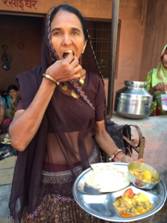 The Hunger Project is honored to be a major partner in the Live Below the Line campaign. The international campaign challenges participants to live on the equivalent of $1.50 for food and drink for five days between April 28 – May 2, 2014 to raise funds for and awareness about extreme poverty.
The Hunger Project is honored to be a major partner in the Live Below the Line campaign. The international campaign challenges participants to live on the equivalent of $1.50 for food and drink for five days between April 28 – May 2, 2014 to raise funds for and awareness about extreme poverty.
Hunger Project programs in Africa, South Asia and Latin America partner with communities living “below the line” to build opportunities for women and men to lead healthy and productive lives, meet their own basic needs and build better futures. Our partners are the authors of their own development and are achieving lasting progress in their communities in areas of health, education, nutrition, family income and gender equality.
Partners like Mangi Bai of India are the reason The Hunger Project is a part of Live Below the Line. Read Mangi’s story:
Possessing courage – the quality of mind or spirit that enables a person to face difficultly/danger without fear
The Indian Government’s midday meal program in local schools was created to incentivize parents to send their children to school and guarantee them access to at least one healthy meal a day. Often, however, grains received from the warehouses are rancid or disappear on route and are sold in the black market. This results in children falling ill from rotten food or not getting a meal at all.
Mangi Bai is an elected woman leader from a village in Madhya Pradesh from a disadvantaged caste. She is uneducated and lives below the poverty line. Several months ago, Mangi observed something both extraordinary and extremely disconcerting – a truck full of wheat on its way to the school to deliver several months’ worth of food was diverted to be sold on the black market. Outraged, she decided in that moment to take on the responsibility of monitoring the program at the schools in her community.
Mangi succeeded in redirecting the truck driver back to the school where the wheat for school meals was unloaded. Not satisfied with just stopping this isolated incident, she conducted investigations which identified the school’s headmaster as the corrupt force selling the childrens’ meals. Displaying tremendous courage, Mangi called in the police and the headmaster was arrested.
Mangi now oversees the cooking in the school kitchen where she has instituted quality controls methods such as taste tests and bookkeeping — activities she diligently undertakes every day.
Mangi Bai exemplifies the work that The Hunger Project undertakes in India to ensure accountability and workability at the local level. In this way, people become self-reliant and successfully end hunger and poverty in their lives and communities.
